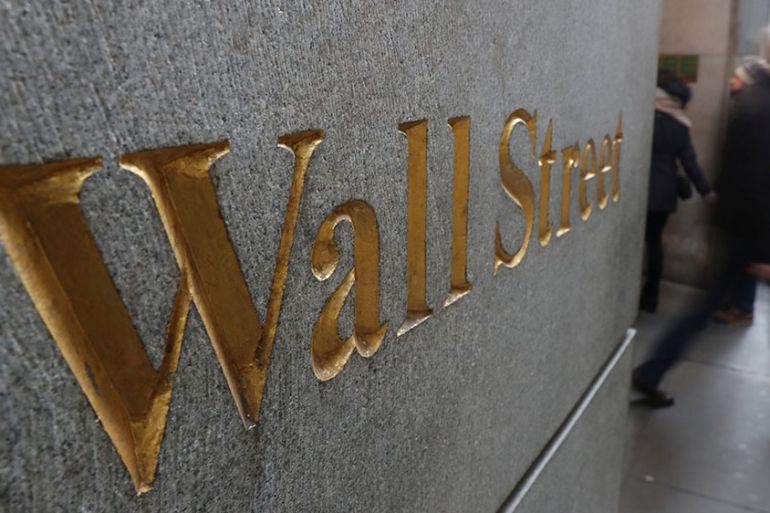Wall Street cheers stellar US jobs report and comments by Powell
Stocks climb higher on back of strong jobs report and signals from US central bank that interest rate policy is flexible

US stocks rallied on Friday following a blockbuster jobs report and reassurances from Federal Reserve Chairman Jerome Powell that the US central bank is not on a fixed path to push interest rates higher.
The Labor Department said on Friday the US economy added 312,000 jobs last month, well above analysts’ expectations, while average hourly earnings rose 3.2 percent from a year earlier.
Keep reading
list of 4 itemsWhy are nations racing to buy weapons?
Parallel economy: How Russia is defying the West’s boycott
US House approves aid package worth billions for Ukraine, Israel
The unemployment rate ticked up slightly in December to 3.9 percent, reflecting an increase in jobseekers – a positive trend.
The robust pace of hiring offered a dose of reassurance to investors following a tumultuous few weeks in which US financial markets have been roiled by concerns over rising borrowing costs, the US-China trade war, slowing global growth and the waning stimulus from President Donald’s Trump‘s tax cuts.
After posting the worst two-day start to the year since 2000, US stocks opened higher Friday on the heels of the stronger-than-expected jobs report and news overnight that the United States and China will resume trade talks next week.
Stocks then extended gains after Powell told a conference in Atlanta that the US central bank is prepared to adjust course on interest rate policy if necessary to support the economy, and that the Fed is listening “sensitively to the message that markets are sending”.
His remarks assuaged investors’ concerns that the Fed could rigidly implement two projected interest rate increases this year, despite market volatility and decelerating global growth.
The major indices ended the day up more than three percent, wiping out all of the losses from the previous day. The S&P 500 rose 84 points, or 3.4 percent. The Dow Jones Industrial Average surged 746 points, or 3.3 percent, while the Nasdaq gained 275 points, or 4.3 percent.
The good news for financial markets on jobs, trade tensions and interest rates followed a raft of troubling signals earlier this week.
Major companies such as Apple say their sales are being jeopardised by the tariff-fueled trade war between the US and China. Factory activity in China and the US have both weakened, with the Institute for Supply Management’s US manufacturing index on Thursday posting its steepest decline in a decade.
The government is about to enter its third week of a partial shutdown, with negotiations stalled over Trump’s insistence that Democrats agree on funding for a wall along the border with Mexico. And attacks by Trump on the Federal Reserve over its rate increases have raised doubts about Chairman Powell’s tenure and the independence of the US central bank – a concern for both the markets and the economy.
‘Don’t see any slowdown yet’
According to Friday’s labour report, the healthcare, food services, construction and manufacturing sectors were the primary contributors to last month’s hiring.
Healthcare and education services added 82,000 jobs in December, the biggest jump since February 2012. Restaurants and drinking placed posted a net gain of 40,700 jobs. Builders added 38,000 construction jobs, while manufacturers increased their payrolls by 32,000 workers.
Businesses are still searching for more workers. The employment site Glassdoor found that job postings have risen 17 percent in the past year to 6.7 million.
“We really don’t see any slowdown yet,” said Andrew Chamberlain, chief economist at Glassdoor.
Despite the increase in the unemployment rate, the influx of people searching for work coupled with the job gains is an indication that the rate should decline in the coming months. Economists estimate that it requires roughly 100,000 job gains each month to satisfy population growth and keep the unemployment rate at its current level.
Hiring has easily eclipsed that pace. In 2018, employers added 2.6 million jobs, or an average of nearly 217,000 a month, according to the Labor Department.